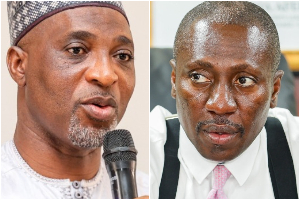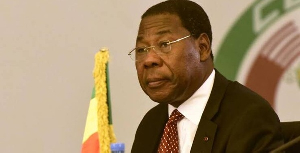In part I, effort was made at persuading us to think differently, and use critical thinking as a step towards rigorous analysis of our development asymmetries. I am going to discuss some other critical factors, but before I proceed, I would quickly address the unacceptable use of insults/ offensive language by some southern Ghanaians in response to northern development issues.
My experience is that whenever a northern development advocate writes an article calling on government to do something for a change, someone from southern Ghana who calls him/herself the more ‘civilised peace seeker, peace lover or peace advocate writes a comment like “These backward northerners are always fighting; don’t like peace; get free education and want free things; let us not spend any money on them. Hmmm…….look at these unprovoked insulting and fighting words from a so-called peaceful person (s) …… Are these the men and women of peace? Whatever the Bible teaches about peace is gone out of the window here. If this is the hallmark of men of peace, then their message is indisputably confusing and absolutely contradictory. Unfortunately, such unprovoked attacks on northern persons and issues are not unique to this Ghanaweb forum. In June 1997, I was travelling from Oslo to Ghana with a colleague (Annan) from Cape Coast. We made a stopover at Zurich airport and met a pastor who was also on his way home from the USA. When I introduced myself, the pastor asked me whether I was from the north and I said yes. His response to my affirmation of being a northerner was shocking. He said ‘I was at the pastor-training institute many years ago with a northerner called Bawa…….. ..You northerners are quite aggressive’. I was shocked at such unprovoked fighting words from no other person than a pastor (a man of God) who is supposed to not judge me by measure of what others have done. I was upset, confused and not sure what to say to him for two reasons: 1) I could not speak harsh words to such an elderly person, who was also a man of God. 2) I thought that if I did, I would be confirming his subjective and unjustified conclusions about northerners. All these thoughts flashed through my mind and I said after some hesitation; ‘Thou shall not judge”. He quickly said that he did not mean I was aggressive. I said, well, why did you not ask me about what I am studying in Norway, or about my family, but only thought of me being one of the aggressive ones? He apologised and I accepted, but that killed our initial enthusiasm to be in his company and we parted from him. My point here is that we should to be practitioners of what we preach and our so called brothers who love peace as opposed to we, the lovers of war, should learn to use peaceful words. On the subject of northern underdevelopment, these insults will not kill our enthusiasm and I am going to try and debunk some of the arguments people use to detract us from the call to initiate development in northern Ghana.
Some the ill-informed ideas or arguments which Amankwa Kofi and others have often raised are that the north is not developing because northerners want to live in the south; don’t want to go back to their region to develop it, should stop conflict/wars before they get development ; and they get free education but provide no contribution. These arguments are too simplistic. The problem with these arguments is that:
1) They do not constitute the substantive impediments to development and
2) Parallels of the northern situation can be seen in the fact that many southern Ghanaians are living in America and Europe. For example, Nana Amankwa Kofi lives in New York and never wants to go back to his village. The issues here is do we really want to know about such parallels, or do we want understand them and apply them in analysis the development issue of the north?
The fact is, the migration and brain-drain from the north to south is not an isolated case. Many Ghanaians like Amankwa Kofi (whose article drew this response) have been living in America and Europe for over 20 years working as doctors, accountants and engineers after receiving free education from Legon, KNUST and UCC before 1990s; when university education was free. How much have they directly contributed to the Ghana Government’s effort at development? And who is asking those Ghanaians to come back home? Is this similar to the northern case? Yes it is!
The Americana and Europeans are saying that these Africans don’t want to go back to their countries to develop them. But why are we running away from Ghana? How can the Europeans and Americans understand why we are running away if they were not born and raised in Ghana? Do we Africans want these Americans to understand? Are they willing to understand why Amankwa Kofi wants to live in New York instead of his village in Ghana? Will they make any effort to understand Amankwa’s explanation or will they dismiss it as nonsense and a lack of will to come back to Ghana? Similarly our southern brothers and sisters do not understand, they think the issue is so simple and it is only that the northerners don’t want to go back to the north.
If our southern brothers and sisters think that running to the south to seek jobs is bad, why don’t they (including Amankwa Kofi) want to return to Ghana? Do they hear the Americans calling for Africans to go back to Africa? The Americans like the Southerners have golden spoons in their mouths and don’t realise that …………..if you don’t come from there, it is really hard to find a golden spoon, let alone put it in your mouth.
The problem of under-development of some areas of Ghana has roots in the adoption of a central-periphery model of development. In normative development terms, we are looking at infrastructure in different regions such as motorable roads, health facilities, portable water, electricity, and secondary industries across all of our regions after 50 years of independence. A comparison of these indicators at a normative level can be justified by seeking to understand how far the different the regions have changed from a starting point of 1957 (year of Independence), although cognizance need to be taken of the differences that existed at independence. No doubt, there is unacceptable disparity between regions and the north is one of the worse areas.
Historically, European contact with southern Ghana began on the coast, and it was not until after 4 November 1896, when the Dagomba Army was finally vanquished by the Germans at the Battle of Adibo that the entire northern Ghana came under colonial rule. The rapid of infrastructure development in southern Ghana began with Governor Gordon Guggisberg, (Gold Coast governor from 1919 to 192). Our history books say that when he was made governor in 1919, Gugisberg presented a ten-year development program to the Legislative Council. His plan targeted the improvement of transportation, including the accelerated expansion of the Sekondi-Tarkwa railroad, which begun in 1898. The successful execution of the plan saw the extension of railway to Kumasi and many other commercial towns /villages of the southern Gold Coast. The plan also included improvement in water provision, hydroelectric projects, public buildings, schools, hospitals, communication lines, etc. and other services. These improvements led the way for setting up the Cocoa Marketing Board and subsequent increased earning form cocoa export by farmers in the now rich areas where northerners are seeking jobs. And don’t forget at this same time the colonial government policy was that schools in the north should not provide education beyond primary 6, because the northerners were good at working in the cocoa farms and mines of the south. Let us imagine that Governor Guggisberg had seen the potential of groundnuts and cotton (crops produced in the north) as profitable enough to feed British industries and had designed another development plan for the north, which included the extension railway, electricity and improved facilities to Northern Ghana. What would be the effect (today) in terms income levels of people in the north? What percentage of Northerners will be moving to the south?
Imagine this! Only 10 years ago electricity was finally delivered via the national grid to northern Ghana after 30 years of operating the Akosombo facility. Now look at the number of small scale industries that has sprung up in the north and the number of young people enrolling in electrical engineering and apprenticeship. Such trades were shunned by northern students when I was growing up because you were not going to get a job as an electrician if 99% of the population did not what electricity was. Almost every home was using kerosene lamps and you were better off training as “kerosene lantern fitter”.
Developing infrastructure makes economic sense; it enhances economic participation and competiveness. Like the entire African continent, historical, political and economic factors have muscled the north out of the capacity to be a competitive through limited provision of basic infrastructure and technology. The central-periphery model of development used by Britain and past governments meant that all industries were concentrated in the Accra-Takoradi –Kumasi Triangle and northerners have to seek opportunity in these areas. Can you imagine what life would be like if just 5% of the industries in Ghana was located in the three northern regions? This week, the upper east farmers called on Government to help them sell vast quantities of tomatoes because the only Tomato factory cannot process all of their produce and our business women are importing tomato from Burkna Faso. Look at the waste and lost opportunity to grow our economic strength as a nation!
Those at the centre of economic and political power have no idea or understanding of the experiences of Northerners and others far away such Western, Volta, and Braong Ahafo, because none of you have ever had the need to travel to Navrongo, Bolgatanga or Sawla for anything which is found in only those towns.
I know some of you might argue for example that we the Kwahus, Ashantis, etc go back to build nice homes in our towns and villages, but development is not about your nice home alone. And the idea that some southerners contribute to developing roads is laudable, but how sustainable is that approach over a long period of time? The truth is that the notion of private-public partnership for development works for some things and not others depending on the income levels of different communities. To build a school or health service structure is a one-off event and easy to undertake, but to run such a health service is another. So if the Kwahus for example help to build a structure for a clinic, it is laudable, but how many of such structures can they build to meet the population’s needs and how feasible will it be to run such clinics over a long period of time? And more seriously how possible will it be to build and maintain roads by citizens’ contribution.
The erroneous idea of that northerners are not doing self-help is laughable, because northerners do engage in self-help projects, but they are limited to, or commensurate with the income levels of the communities. Most of us know that between 1982 and 1989 Kumasi city roads were terrible, with large pot holes; in fact dugouts. In spite of all the riches of Ashanti, it would have been crazy/ unreasonable to expect that the residents /citizens could realistically contribute to asphalt all of the Kumasi city roads. The Rawlings government asphalted all the roads in Kumasi. So please let us stop being Naive about the potential for self-help to achieve the north’s development objectives/targets. There are lots of self-help projects in the north, but it is impossible to expect low income communities such as occurs in the north and elsewhere in Ghana to contribute to such capital intensive infrastructure projects on a sustainable basis.
No one should think I dismiss the negative role of conflicts to development, but for some people to argue that all conflicts must end before development is pursued in the north does not make sense. Ending conflicts is part of social development and I argue that both social and economic development must proceed at the same time, although the history of Western Europe bears testimony to the fact economic development preceded social development. For example more food and basic infrastructure were developed before anyone thought about women’s and child rights and domestic violence.
Finally, as way of grounding my case for an accelerated development of Northern Ghana, it is important for us to understand also the notion of social investment in relation to current policy debates. In fact, developing any area of Ghana which has experienced social injustice can be seen as one of positive discrimination and in light of the concept of social investment. The implication is simple. Rather than wait for the untapped/ under-developed human resources of these areas to be transformed from agents of positive contribution to war mongers, chieftaincy contractors and criminals, we would rechannel that energy by investing in those areas. Such human capital development also builds social capital and enhances economic participation. If we ignore this, we will end up (in the coming decades) with criminals from such areas in our “paradise cities of the southern Ghana”. The hell of the north and other under-developed areas in Ghana is already encroaching on the “paradise-cities of the south”, and tell me how long it is going to take government to dismantle Agbogbloshie market or the ‘Sodom and Gomorrah’ trouble camp. Many of such enclaves are going to mushroom everywhere soon. To remember the war at Agbogbloshie Market immediately after the 2008 elections, involving (in my opinion) idle and purposeless young people is enough to understand my point being made here. The spill-over from such conflicts of people from underdeveloped regions will become common and the victims of such conflicts will not be limited to those who actually hail from such regions. Please let us reason like a people (Ghanaians) who are one of the most educated groups in the world.
The use of offensive language will not erase the problems of under-development; only critical thinking will help us out of under-development. Critical thinking is the art of asking questions. Not just any questions but better questions. It involves asking questions about our own questions and answers. We Ghanaians need to ask questions about regional issues, how they are related to other national issues and more importantly think about the alternatives to what we think are the right answers. In the case of the northern development discussion, you need to ask yourself; what are the most reasonable alternatives to the current situation in the north? How could it be different? What would it look like if it was different?
Thank you for reading this piece and please remember this: Developing the north or any other underdeveloped area of Ghana is an investment, which the experts say imposes responsibility on individuals and society to transform and enhance their economic competiveness. Dr. Ahmed Bawa Kuyini
For CEVS-Ghana, Tamale.
Opinions of Tuesday, 17 March 2009
Columnist: Kuyini, Ahmed Bawa














